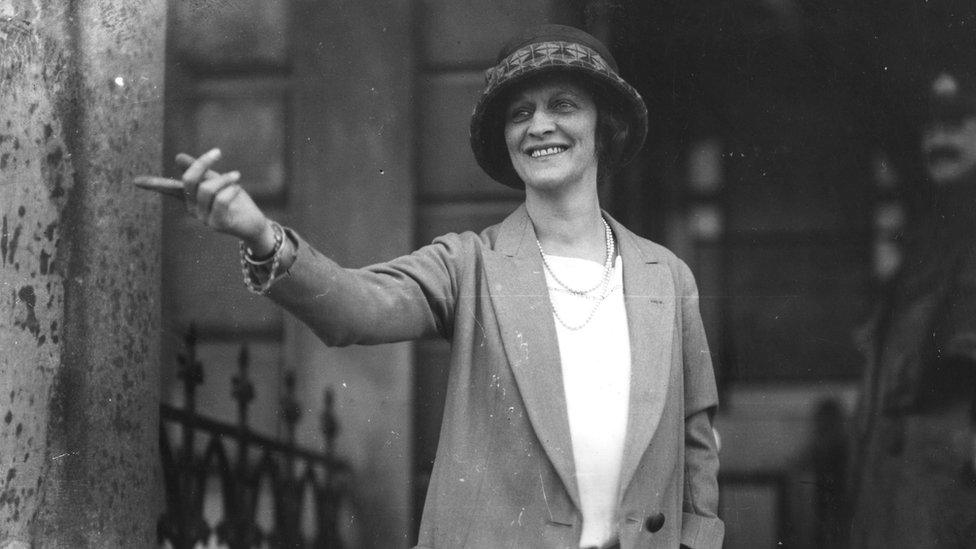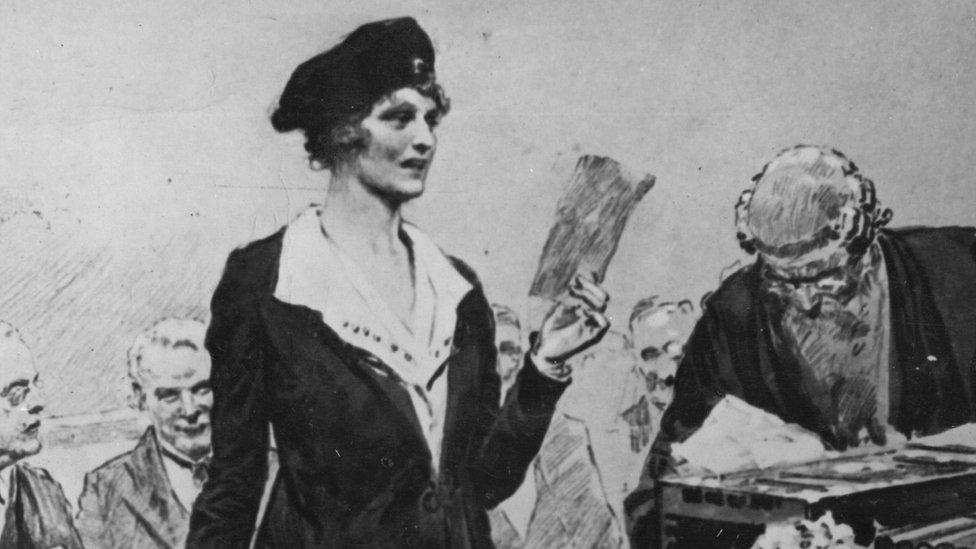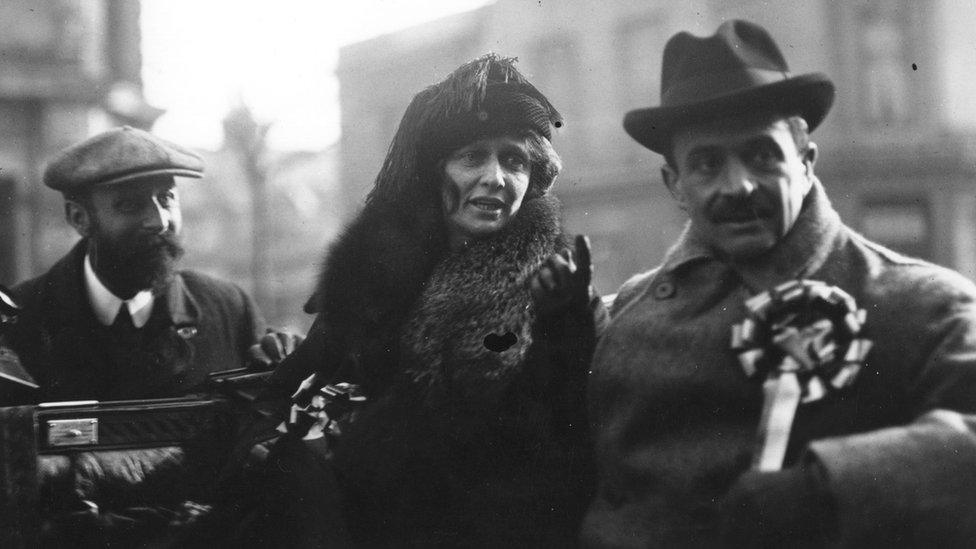What did the first woman in Parliament have to say?
- Published
In 1919, Lady Nancy Astor became the first woman to sit in Parliament
It is now commonplace to think of a woman speaking out in Parliament - even if the gender split on the famous green benches is yet to reach 50/50.
But 100 years ago, no woman had ever given a maiden speech to MPs until Nancy Astor took to her feet.
She was not the first woman elected to Westminster - that title goes to Constance Markievicz, who won in the 1918 general election but, as a member of Sinn Fein, refused to take her seat.
And so, on 24 February 1920, Lady Astor made history in the chamber as the MP for Plymouth.
What did the American-born Unionist politician have to say?
In the first line of her speech, Lady Astor said she would "not begin by craving the indulgence of the House", adding she knew it was "almost as difficult" for some of the men MPs to accept her as it was for her to come into the chamber.
But the south-west MP tried to placate the crowd - who heckled her throughout - saying they "should not be frightened of what Plymouth sends out into the world".
She added: "After all, I suppose when Drake and Raleigh wanted to set out on their venturesome careers, some cautious person said, 'do not do it, it has never been tried before'.
"But, on the whole, the world is all the better for those venturesome and courageous west country people, and I would like to say that I am quite certain that the women of the whole world will not forget that it was the fighting men of Devon who dared to send the first woman to represent women in the mother of Parliaments."
After making her point, Lady Astor moved onto the crux of her contribution - the evils of alcohol.
She was making her maiden speech during the Liquor Traffic Restrictions debate, discussing the rules needed for the sale of alcoholic drinks at a time when the United States was bringing in prohibition.
And it soon became clear Lady Astor was anti-alcohol and wanted Britain to follow in the footsteps of its American cousins.

Lady Astor campaigning for her seat again in 1923
Responding to remarks by a fellow Unionist MP, Sir John David Rees, Lady Astor agreed many laws were "vexatious", as he had claimed earlier, adding: "When we want to go 50 or 60 miles an hour down the Bath Road it is very tiresome, when we come to a village, to have to go 10 miles an hour."
But, she then said: "Why do we have to do it? It is for the good of the community. We might kill children. He talks about the restrictions. I maintain that they brought a great deal of good to the community."
Lady Astor claimed toughening up rules on drinking saw the convictions of drunkenness among women fall to one fifth of what they were during the World War I, along with a large reduction of deaths from "delirium tremens" - a rapid onset of confusion caused by alcohol withdrawal.
"I could talk for hours on the moral gains which you cannot put on paper, they are so enormous," she said.
"I have as good a sense of humour as any other honourable member, but when I think of the ruin and the desolation and the misery which drink brings into the houses of the working men and women as well as of the well-to-do, I find it a little difficult to be humorous."
'Men will get their freedom'
Lady Astor then told a story of seeing a five-year-old child waiting outside a pub in her constituency for their mother, but as she emerged with "oaths and curses", the child replied with "shrieks" before running away.
"I am thinking of the women and children," she said. "I am not so tremendously excited about what you call the freedom of the men.
"The men will get their freedom. I do not want to rob them of anything that is good. I only want to ask them to consider others."

An artist's impression of Lady Astor at the dispatch box
While Lady Astor desired prohibition, she admitted the country was "not ripe" for it, adding she was "far too intelligent" to push for it.
But she believed men would "get nearer the paradise they seek if they try to get it through a greater inspiration than drink" and hoped, at some point, the working men of Britain would favour banning alcohol.
After an attack on the brewing industry and their profiteering during the war, Lady Astor was met by shouts of derision from her fellow MPs.
But she replied: "I know what I am talking about, and you must remember that women have got a vote now and we mean to use it, and use it wisely, not for the benefit of any section of society, but for the benefit of the whole."
'Give up their appetites'
Lady Astor praised the prime minister of the time, David Lloyd George, saying she was a "great admirer" of his for his position on alcohol, quoting him as saying "drink was a greater enemy than the German submarine".
But the Commons was moved to laughter when she said there had been a "real awakening throughout the country" and there were "people in England, and thousands of them, who want to see the country better and they are willing to give up their appetites".
She added: "I do not really want to take the joy out of the world, or happiness, or anything that really makes for the betterment of the world; but you know, and I know, that drink really promises everything and gives you nothing.
"You know it, and the House knows it, and the world is beginning to recognise it."

Lady Astor succeeded her husband, Waldorf Astor (right), as MP for Plymouth when he was elevated to the House of Lords
Concluding her historic speech, Lady Astor went back to her original point, asking for her peers to think "bigger".
"I do not want you to look on your lady member as a fanatic or a lunatic. I am simply trying to speak for hundreds of women and children throughout the country who cannot speak for themselves," she said.
"I want to tell you that I do know the working man, and I know that, if you do not try to fool him, if you tell him the truth about drink, he would be as willing as anybody else to put up with so-called vexatious restrictions."
After the speech, she claimed Winston Churchill had told her: "I felt as if a woman had entered my bathroom and I had nothing to protect myself with except a sponge."